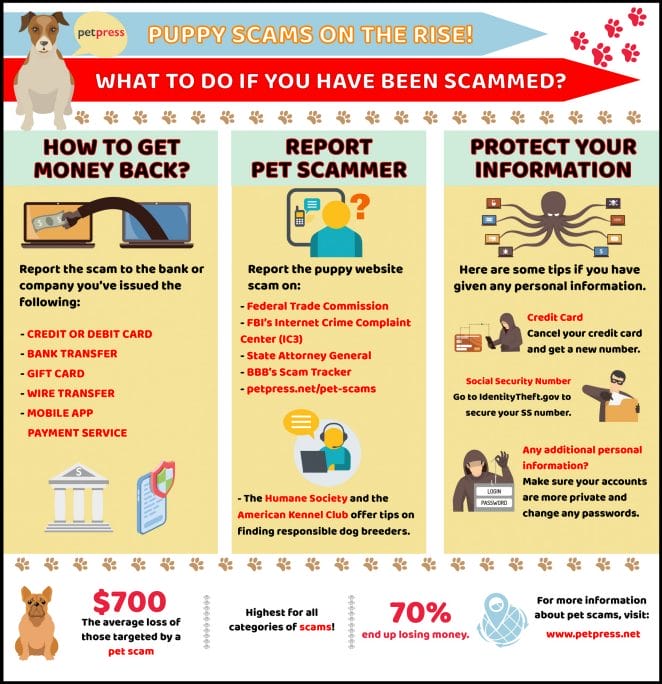Pet scams have been on the rise since the pandemic started. A lot of pet lovers became victims instead of trying to get a new pet that stole their hearts. Many have asked over the days how to avoid these situations and what to do when it has already happened. We did our research since we’ve been having complaints about pet scams on our Facebook groups and here are the best tips on how to retrieve your money in case you got scammed.

What To Know? (FAQs)
Whether you have paid online via credit card, debit card, wire transfer, or gift card, you may contact the company or banks and report the pet scam in order to have your transaction reversed and investigated.
You may contact the bank that you have done an online payment or deposit. Tell them it was a fraudulent charge and report on what type of transaction it was. Banks usually investigate the transaction made and request proof to reverse the transaction and get your money back.
There are numerous websites where you can report and confirm a fraud like the Federal Trade Commission, FBI’s Internet Crime Complaint Center, and you can check the seller’s website or email legibility at Petscams via our “report a scam”.
Gather as much evidence from the scammer’s profile. You can start by checking if their website domain is public or if they have scam reviews online or on social media. Take screenshots of your conversation as well. You can show these to the FBI’s Internet Crime Complaint Center for investigation.

Share this Image On Your Site
1. How Did You Get Scammed and How Did You Pay For It?
Pet scams happen when sellers ask for money upfront online and ask for additional fees and trick you for necessary papers and shots of your prospective new pet. It is important to avoid this especially when you haven’t met the seller in person. But if ever you have been a victim of this scam and you have already paid, then it is not the end of the world yet.
According to FTC and what to do when you are scammed, here are the best ways to report and retrieve how much you have spent online:
Credit or Debit Card
You may contact the company or bank that you have issued the credit card or debit card with. Tell them it was a fraudulent charge and report on what type of transaction it was. Sometimes, the company and banks will allow you to reverse the transaction and you may get your money back.

Interact Transfer From Your Bank Account
If the scammer had to do the transfer itself, which is not usual, as they wouldn’t be authorized to do a transfer from your bank account. They may do so in form of a credit card and its details but they can not withdraw from it from a bank.
Gift Card
Contact the company that issued the gift card and let them know that it was used in a scam. Most of the time if you paid by gift card you will not be able to recover the money. You can contact the gift card provider to see if they may be able to stop this. Make sure to save all the details and receipts.
Wire Transfer Through Any Money Transfer Service
Most of the time if you pay by wire transfer you will not be able to recover the money. If you file a police report (depending on the country of the bank) you may file a police report and they get investigated for fraud. Sometimes, they will ask for the complete details and reverse the wire transfer to give your money back, if the wire transfer has not been completed.
Did You Send Cash?
If they were local and paid you cash, hopefully, you have an invoice and they are from a reputable breeder as you are not getting the money back. In the digital era, it would seem weird to actually mail someone cash country (or international) but people still do this. If you sent it by mail, contact the postal office if it has not arrived yet. We tell you how to report it below.

2. Where is the scammer located? Can you report a fraud to the police?
Absolutely, yes! The police may help you in tracking down the scammer and refer you to experts that handle pet scams. If you suspect or have been victimized by a pet scam, you may report it to:
- the Federal Trade Commission (online or at 877-382-4357)
- the FBI’s Internet Crime Complaint Center (IC3), if the scam occurred online
- the BBB Scam Tracker
- You can check sellers’ emails and websites against lists of suspected scammers maintained by PetScams
- The Humane Society and the American Kennel Club offer tips on finding responsible dog breeders.
- At PetPress, you can also report a scam and we will have the scammer’s information posted on our website to warn others.
3. Did you give a scammer your personal information?
Sometimes, scammers ask for personal information to take advantage of during the transaction. Usually, personal information should be kept confidential or there should be a confidentiality agreement between both parties in exchange of personal information. They also really target bank account details, so here are some tips if you have given any personal information:
- Credit Card – You may want to cancel your credit card and get a new number. As described above you should have already disputed the transaction
- Social Security Number – It would be rare but by any chance did you give them any really personal information such as your social security number? Go to IdentityTheft.gov to see what steps you should take to secure your social security number, including how to monitor your credit.
- Any additional personal information? Many times scammers will look through your friends in common or pictures from your Facebook. It is always a good time to make sure your accounts are more private and change any passwords if you sent them any details. This is just good housekeeping.

4. How To Track Down A Scammer?
We recommend looking for as much information about the scammer and what domain it uses to scam pet lovers. Follow these steps below:
- Whois (see if anything from the domain is public)
- Search for “Their business” Scam Reviews online
- Right click on images (Search Google For Images) to see if they are real or not.
- Call your Credit Card / Banker
These are the first steps, next would be looking at this article on how to shut down a pet website scam.

We know how much of a headache a pet scam could be. And so, we must always remember to be careful buying a puppy online. We may be fond of something that isn’t real. To know more about pet scams, read our article on tips on how to spot a pet scammer.


Scammed by animal welfare in New york